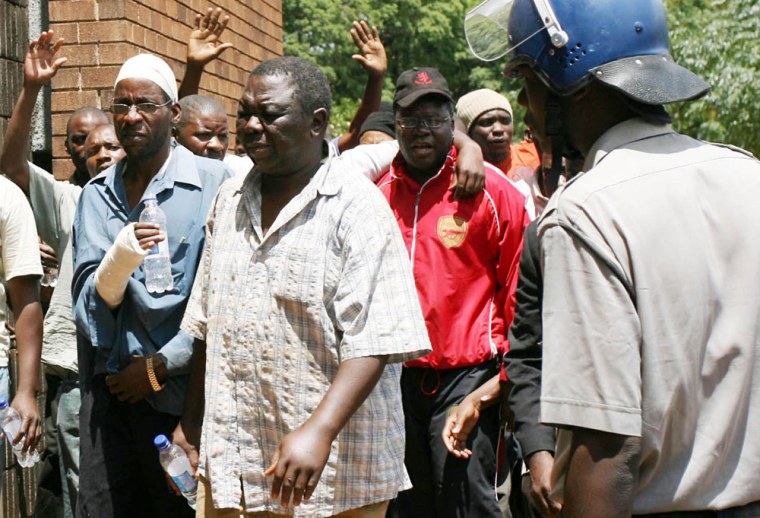Two harrowing days in police custody have left Zimbabwean opposition leader Morgan Tsvangirai with serious physical injuries but also renewed standing as head of an anti-government movement that is showing more energy than it has in years.
Tsvangirai's failure to mount protests after several tainted elections had fueled criticism that he lacked the strategic savvy -- and perhaps even the physical courage -- to lead a final push against President Robert Mugabe. As recently as Friday, speaking before journalists in Johannesburg, Tsvangirai played down the need for demonstrations, saying: "Going in the streets is only one of the strategies. . . . A struggle has various stages."
Yet two days later, police arrested Tsvangirai, 55, for attending a political rally in defiance of a ban on such gatherings. Though organizers portrayed the event as a prayer meeting in an attempt to sidestep the ban, it in fact marked the launch of an ambitious new "Save Zimbabwe" campaign, bringing together most major elements of an opposition that had splintered badly in 2005.
"If they ever wanted to boost Morgan Tsvangirai's popularity, they've done it," said David Coltart, an opposition lawmaker who is not aligned with Tsvangirai, speaking from Helsinki, where he was observing an election. "Whether Morgan intended this or not, this thing has been thrust upon him, and probably emboldened him."
'Sadistic' attack
At the gathering Sunday, police shot dead one anti-government activist, rounded up 50 others and beat many of them severely, opposition officials said. Those arrested appeared in court together Tuesday, wearing casts, bandages and bloodied, dirty clothing, and won both access to their attorneys and the right to medical care at a Harare clinic, news reports said.
Outside the court, Tsvangirai told journalists, "It was sadistic to attack defenseless people," according to the Reuters news agency.
The worst injuries were suffered by Tsvangirai, a burly former mineworker and union activist who appeared in court with a swollen face and stitches in a gash on his head. Party officials said he lost consciousness three times during his first day in jail, and in a brief meeting with his wife Monday morning, Tsvangirai could barely eat, walk or speak.
His harsh treatment left many people concluding that Mugabe, attempting to maintain control after 27 years in power, regards Tsvangirai as his most serious threat.
Most of the detained activists were taken back to court late Tuesday, the Associated Press reported. They were released into their attorneys' custody and are due back in court Wednesday morning. Tsvangirai was one of 12 who remained at the clinic.
The opposition leader has his roots in Zimbabwe's labor movement and was among the founding members of the Movement for Democratic Change in 1999. He ran for president against Mugabe in 2002, and many outside observers say they believe he would have won if Mugabe's forces had not manipulated the election. Tsvangirai has been charged with several crimes, including treason, but has been acquitted.
Mugabe's blunder?
Despite his personal popularity, Tsvangirai was not able to turn discontent into effective demonstrations after tainted elections in 2000, 2002 and 2005 or during a brutal slum-clearance campaign in 2005 that left 700,000 Zimbabweans without homes or jobs. His party split later that year, and he has struggled since to regain his stature.
Even with the party fractured, opposition to Mugabe's rule began rising again late last year as inflation topped 1,000 percent and persistent shortages of gas and food affected millions of Zimbabweans. Trade union activists and several civic groups, such as the National Constitutional Assembly and Women of Zimbabwe Arise, increasingly drove this new activism. The breakaway faction of the Movement for Democratic Change grew more aggressive, issuing a flier for Sunday's rally that declared, "It is defiance or death."
But the events of recent days have altered the chemistry of opposition politics again.
John Mw Makumbe, a political analyst at the University of Zimbabwe, said Mugabe had blundered badly in mistreating Tsvangirai. "He has really raised Morgan's profile beyond his wildest imagination," Makumbe said, speaking from Harare, the capital. "This time, Morgan is almost being viewed as the president."
U.S., British and U.N. officials have sharply criticized the government for arresting and beating opposition activists.
"The world community again has been shown that the regime of Robert Mugabe is ruthless and repressive and creates only suffering for the people of Zimbabwe," Secretary of State Condoleezza Rice said in a statement issued in Washington. She demanded that Tsvangirai and other activists be freed.
There have been reports of sporadic unrest in recent days, but nothing resembling the violence on Sunday, when police used tear gas, water cannons and live ammunition to control rock-throwing youths.
Attention now is focused on what Tsvangirai will do with his enhanced stature when, and if, he is freed from jail. "We'll wait to see if Morgan will really rise to the occasion when he's recovered," Makumbe said.
